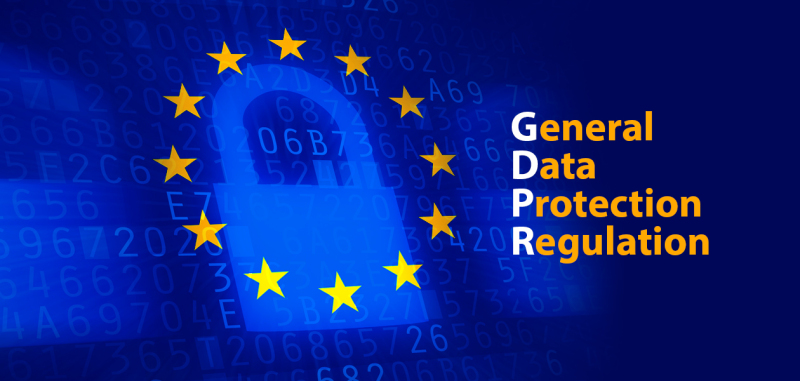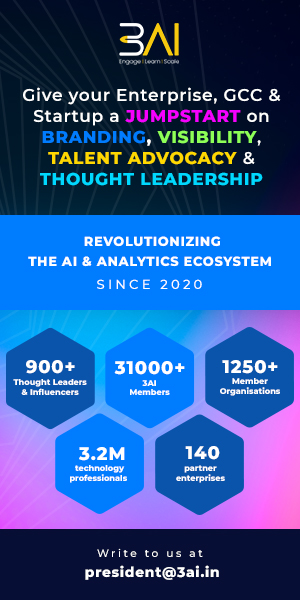GDPR & AI: A perspective
3AI April 5, 2018

The GDPR General Data Protection Regulation (GDPR), which goes into effect May 25, 2018, requires all companies that collect data on citizens in EU countries to provide a “reasonable” level of protection for personal data. The ramifications for non-compliance are significant, with fines of up to 4% of a firm’s global revenues.
This European Union’s sweeping new data privacy law, is triggering a lot of sleepless nights for CIOs grappling with how to effectively comply with the new regulations and help their organizations avoid potentially hefty penalties.
Will AI be the only answer to the highly regulated GDPR to come?
The bar for GDPR compliance is set high. The regulation broadly interprets what constitutes personal data, covering everything from basic identity information to web data such as IP addresses and cookies, along with more personal artifacts including biometric data, sexual orientation, and even political opinions. The new regulation mandates, among other things, that personal data be erased if deemed unnecessary. Maintaining compliance over such a broad data set is all the more challenging when it is distributed among on-premises data centers, cloud offerings, and business partner systems.
The complexity of the problem has made GDPR a top data protection priority. A PwC survey found that 77% of U.S. organizations plan to spend $1 million or more to meet GDPR requirements. An Ovum report found that two-thirds of U.S. companies believe they will have to modify their global business strategies to accommodate new data privacy laws, and over half are expecting to face fines for non-compliance with the pending GDPR legislation.
This begs the question: Can AI help organizations meet the GDPR’s compliance deadline and avoid penalties? After all, AI is all about handling and deriving insights from vast amounts of data, and GDPR demands that organizations comb through their databases for rafts of personal information that falls under GDPR’s purview. The answer is not only in the affirmative, but there are several significant instances where AI solutions to regulation compliance and governance are already on the high.
For example, Informatica is utilizing advances in artificial intelligence (AI) to help their organizations improve visibility and control over geographically dispersed data. It will provide companies with a holistic, intelligent, and automated approach to governance, for the challenges posed by GDPR.
AI interventions in Data Regulation Compliance and Governance
Data location Discovery and PII Management
It’s essential to learn the location of all customer data in all systems. The first action a company need to do is creating a risk assessment with a guess about what kind of data is likely to be requested how many requests might be expected. Locating all customer data and ensuring GDPR compliant management can be a daunting task, but there are options for automating those processes.
With AI, one can quite easily recognize concepts like ‘person names,’ which is important in this context. To find out how many documents you have that refer to persons (as opposed to companies), or to find out how many documents, social security numbers, phone numbers you have in any one repository, one can combine those analytics, and then begin to understand that the odds are that they have a lot of personal data in this repository, which provides a way to prioritize in the context of GDPR.
For example, M-Files uses Artificial Intelligence to streamline the process of locating and managing PII (personally identifiable information), which often resides in a host of different systems, network folders and other information silos, making it even more challenging for companies to control and protect it.
AI based data cataloguing
A solution that utilizes AI-based machine learning techniques to improve tracking and cataloging data across hybrid deployments can help companies do more accurate reporting while boosting overall efforts to achieve GDPR compliance. By automating the process of discovering and properly recording all types of data and data relationships, organizations can develop a comprehensive view of compliance-related data tucked away in non-traditional sources such as email, social media, and financial transactions – a near-impossible task using traditional solutions and manual processes.
Contextual Engines for Diversely Changing Data Environments
The GDPR changes how companies should look at storage of data. The risk of data getting compromised is increased based on how is stored, in how many different systems it’s stored, how many people are involved in that process, and how long it’s kept. Now that PII on job applications is regulated under GDPR, a company may want to routinely get rid of that data fairly quickly to avoid risk of data breach or audit. There are those kinds of procedural things that organizations will have to really think about.
There are instances where completely removing all data is impossible. You have to retain some data like billing records and there might be conflicting regulations, such as records retention laws. Now, if the citizen asks you to remove that, it’s going to add a lot of complexity to the process, in terms of understanding what data can be removed from the system and what cannot be removed. There will be conflicting situations where this regulation says something, and then you might have an Accounting Act or something in a local or state regulation that says something else.
This requires contextual engines built using AI that can be highly context aware based on the changing circumstances around the data and create a plan of how each data should be stored, managed and purged. This can also provide accurate insights on the levels of encryption and complex data storage techniques that need to be implemented for different data, thereby conserving hardware resources and increasing protection against malignant attacks and data breaches while minimizing risk of GDPR violations.
Working out the Kinks in AI led GDPR
GDPR aims to give EU citizens greater control over their personal data and to hold companies accountable on matters such as data use consent, data anonymization, breach notification, cross-border data transfer, and appointment of data protection officers. For example, organizations will have to honor individuals’ “right to be forgotten,” where applicable — fulfilling requests to delete information and providing proof that it was done. They must also obtain explicit, rather than implied, permission to gather data. And they are required to allow people to see their own data in a commonly readable format.
The system will undoubtedly work those issues out, but, in the meantime, companies should roll up their sleeves and take a thorough, systematic multi-step approach. The multi-step strategy should include:
Data. A comprehensive plan to document and categorize the personal data an organization has, where it came from, and who it is shared with.
Privacy notices. A review of privacy notices to align with new GDPR requirements.
Individuals’ rights. People have enhanced rights, such as the right to be forgotten, and new rights, such as data portability. This demands a check of procedures, processes, and data formats to ensure the new terms can be met.
Legal basis for processing personal data. Companies will need to document the legal basis for processing personal data, in privacy notices and other places.
Consent. Companies should review how they obtain and record consent, as they will be required to document it. Consent must be a positive indication; it cannot be inferred. An audit trail is necessary.
Children. There will be new safeguards for children’s data. Companies will need to establish systems to verify individuals’ ages and gather parental or guardian consent for data-processing activity.
Data breaches. New breach notification rules and new fines will affect many organizations, making it essential to understand how to detect, report, and investigate personal data breaches.
Privacy by design. A privacy by design and data minimization approach will become an express legal requirement. It’s important for organizations to plan how to meet the new terms.
Data protection officers. Organizations may need to designate a data protection officer and figure out who will take responsibility for compliance and how they will position the role.
Will GDPR Aligning Measures Be Necessarily Disruptive?
Many companies are going through significant changes as a result of the new regulations, and the efficiency and speed the AI-powered regulation compliance platform offer can significantly help streamline the entire process if companies want to ensure compliance.
Hence, there are plenty of challenges keeping CIOs up at night. By taking a more intelligence-driven approach to data discovery, preparation, management, and governance, the impending GDPR mandate doesn’t have to be one of them.






